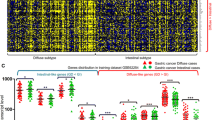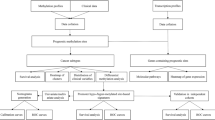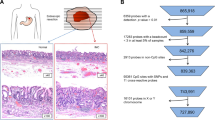Abstract
Backgrounds
The two main types of gastric cancer, intestinal and diffuse, have different etiologies and pathogeneses, indicating different mechanisms of histogenesis and carcinogenesis that remain poorly understood.
Methods
The expression and correlation patterns of 13 development-, differentiation-, proliferation-, and invasion- related genes were compared between 23 diffuseand 27 intestinal-type gastric cancers by quantitative RT-PCR. In addition, the most representative results were confirmed by western blot analysis and methylation analysis was also performed in the two gastric cancer types using methylation-specific PCR.
Results
Seven genes, including SOX2, Muc5ac, CDH1, Muc4, TFF1, FGF7, and MMP10, with differential expression and correlation patterns between the two histological gastric cancer types were identified. Furthermore, Muc5ac, TFF1, MMP10, CDH1, and CDX2 expression levels were linked to DNA methylation status.
Conclusion
These data provide insights into type-specific gastric carcinogenesis, suggesting new approaches for a more profound investigation of the pathologic events that drive intestinal- and diffuse-type gastric cancer.
Similar content being viewed by others
References
Torre, L. A. et al. Global cancer statistics. CA Cancer J Clin 65, 87–108 (2012).
Allemani, C. et al. CONCOR. Working Group. Global surveillance of cancer survival 1995-2009: analysis of individual data for 25,676,887 patients from 279 population-based registries in 67 countries (CONCORD-2). Lancet 385, 977–1010 (2014).
Siewert, J. R., Bottcher, K., Stein, H. J. & Roder, J. D. Relevant prognostic factors in gastric cancer: ten-year results of the German Gastric Cancer Study. Ann Surg 228, 449–461 (1998).
Yokota, T. et al. Significant prognostic factors in patients with early gastric cancer. Int Surg 85, 286–290 (2000).
Lauren, P. The two histological main types of gastric carcinoma: diffuse and so-called intestinal-type carcinoma. Acta Pathol Microbiol Scand 64, 31–49 (1965).
Fuchs, C. S. & Mayer, R. J. Gastric carcinoma. New Engl J Med 333, 32–41 (1995).
Inberg, M. V., Laurén, P., Vuori, J. & Viikari, S. J. Prognosis in intestinal-type and diffuse gastric carcinoma with special reference to the effect of the stromal reaction. Acta Chir Scand 139, 273–278 (1973).
Graziano, F., Humar, B. & Guilford, P. The role of the E-cadherin gene (CDH1) in diffuse gastric cancer susceptibility: from the laboratory to clinical practice. Ann Oncol 14, 1705–1713 (2003).
Yuasa, Y. Control of gut differentiation and intestinaltype gastric carcinogenesis. Nat Rev Cancer 3, 592–600 (2003).
Correa, P. Human gastric carcinogenesis: a multistep and multifactorial process-First American Cancer Society Award Lecture on Cancer Epidemiology and Prevention. Cancer Res 52, 6735–6740 (1992).
Silberg, D. G. et al. Cdx2 ectopic expression induces gastric intestinal metaplasia in transgenic mice. Gastroenterology 122, 689–696 (2002).
Nakatsuru, S. et al. Somatic mutation of the APC gene in gastric cancer: frequent mutations in very well differentiated adenocarcinoma and signet-ring cell carcinoma. Hum Mol Genet 1, 559–563 (1992).
Park, W. S. et al. Frequent somatic mutations of the beta-catenin gene in intestinal-type gastric cancer. Cancer Res 59, 4257–4260 (1999).
Wu, M. S. et al. Clinicopathological significance of altered loci of replication error and microsatellite instability-associated mutations in gastric cancer. Cancer Res 58, 1494–1497 (1998).
Tamura, G. et al. Detection of frequent p53 gene mutations in primary gastric cancer by cell sorting and polymerase chain reaction single-strand conformation polymorphism analysis. Cancer Res 51, 3056–3058 (1991).
Babu, S. D., Jayanthi, V., Devaraj, N., Reis, C. A. & Devaraj, H. Expression profile of mucins (MUC2, MUC5AC, MUC6) in Helicobacter pylori infected pre-neoplastic and neoplastic human gastric epithelium. Mol Cancer 19, 5–10 (2006).
Byrd, J. C. & Bresalier, R. S. Alterations in gastric mucin synthesis by Helicobacter pylori. World J Gastroenterol 6, 475–482 (2000).
Camilo, V. et al. Helicobacter pylori and the BMPpathway regulate CDX2 and SOX2 expression in gastric cells. Carcinogenesis 33, 1985–1992 (2012).
Mori, N. et al. Helicobacter pylori induces matrix metalloproteinase-9 through activation of nuclear factor kappaB. Gastroenterology 124, 983–992 (2003).
Costa, A. M. et al. Helicobacter pylori Activates Matrix Metalloproteinase 10 in Gastric Epithelial Cells via EGFRand ERK-mediated Pathways. J Infect Dis 213, 1767–1776 (2016).
Kim, O. et al. Gastrokine 1 inhibits gastrin-induced cell proliferation. Gastric Cancer 19, 381–391 (2016).
Herman, J. G., Graff, J. R., Myöhänen, S., Nelkin, B. D. & Baylin, S. B. Methylation-specific PCR: a novel PCRassay for methylation status of CpGislands. Proc Natl Acad Sci U S A 93, 9821–9826 (1996).
Menheniott, T. R., Kurklu, B. & Giraud, A. S. Gastrokines: stomach-specific proteins with putative homeostatic and tumor suppressor roles. Am J Physiol Gastrointest Liver Physiol 304, G109–121 (2013).
Moss, S. F. et al. Decreased expression of gastrokine 1 and the trefoil factor interacting protein TFIZ1/GKN2 in gastric cancer: influence of tumor histology and relationship to prognosis. Clin Cancer Res 14, 4161–4167 (2008).
Soutto, M. et al. Loss of TFF1 is associated with activation of NF-κB-mediated inflammation and gastric neoplasia in mice and humans. J Clin Invest 121, 1753–1767 (2011).
Kamachi, Y., Uchikawa, M. & Kondoh, H. Pairing SOX off: with partners in the regulation of embryonic development. Trends Genet 16, 182–187 (2000).
Que, J. et al. Multiple dose-dependent roles for Sox2 in the patterning and differentiation of anterior foregut endoderm. Development 134, 2521–2531 (2007).
Li, X. L. et al. Expression of the SRY-related HMGbox protein SOX2 in human gastric carcinoma. Int J Oncol 24, 257–263 (2004).
Buisine, M. P. et al. Developmental mucin gene expression in the gastroduodenal tract and accessory digestive glands. I. Stomach. A relationship to gastric carcinoma. J Histochem Cytochem 48, 1657–1666 (2000).
Senapati, S. et al. Deregulation of MUC4 in gastric adenocarcinoma: potential pathobiological implication in poorly differentiated non-signet ring cell type gastric cancer. Br J Cancer 99, 949–956 (2008).
Mizoshita, T. et al. Expression of Cdx1 and Cdx2 mRNAs and relevance of this expression to differenemphasis on participation in intestinal metaplasia of the human stomach. Gastric Cancer 4, 185–191 (2001).
Finch, P. W. & Rubin, J. S. Keratinocyte growth factor/fibroblast growth factor 7, a homeostatic factor with therapeutic potential for epithelial protection and repair. Adv Cancer Res 91, 69–136 (2004).
Yoshino, M. et al. Expression and roles of keratinocyte growth factor and its receptor in esophageal cancer cells. Int J Oncol 31, 721–728 (2007).
Toyokawa, T., Yashiro, M. & Hirakawa, K. Co-expression of keratinocyte growth factor and K-sam is an independent prognostic factor in gastric carcinoma. Oncol Rep 21, 875–880 (2009).
Shaoul, R. et al. Elevated expression of FGF7 protein is common in human gastric diseases. Biochem Biophys Res Commun 350, 825–833 (2006).
Saitoh, T. et al. Molecular cloning and characterization of FRA T2, encoding a positive regulator of the WNT signaling pathway. Biochem Biophys Res Commun 281, 815–820 (2001).
Saitoh, T. & Katoh, M. FRAT1 and FRAT2, clustered in human chromosome 10q24.1 region, are up-regulated in gastric cancer. Int J Oncol 19, 311–315 (2001).
Shapiro, S. D. Matrix metalloproteinase degradation of extracellular matrix: biological consequences. Current Opinion in Cell Biology 10, 602–608 (1998).
Duong, T. D. & Erickson, C. A. MMP-2 plays an essential role in producing epithelial-mesenchymal transformations in the avian embryo. Dev Dyn 229, 42–53 (2004).
Curran, S. & Murray, G. I. Matrix metalloproteinases in tumour invasion and metastasis. J Pathol 189, 300–308 (1999).
Liu, H. et al. Overexpression of matrix metalloproteinase 10 is associated with poor survival in patients with early stage of esophageal squamous cell carcinoma. Dis Esophagus 25, 656–663 (2012).
García-Irigoyen, O. et al. Matrix metalloproteinase 10 contributes to hepatocarcinogenesis in a novel crosstalk with the stromal derived factor 1/C-X-C chemokine receptor 4 axis. Hepatology 62, 166–178 (2015).
van Roy, F. & Berx, G. The cell-cell adhesion molecule E-cadherin. Cell Mol Life Sci 65, 3756–3788 (2008).
Becker, K. F. et al. E-cadherin gene mutations provide clues to diffuse type gastric carcinomas. Cancer Res 54, 3845–3852 (1994).
Nardone, G. et al. Gastrokine 1 expression in patients with and without Helicobacter pylori infection. Dig Liver Dis 39, 122–129 (2007).
Resnick, M. B. et al. Global analysis of the human gastric epithelial transcriptome altered by Helicobacter pylori eradication in vivo. Gut 55, 1717–1724 (2006).
Leung, W. K. et al. Expression of trefoil peptides (TFF1, TFF2, and TFF3) in gastric carcinomas, intestinal metaplasia, and non-neoplastic gastric tissues. J Pathol 197, 582–588 (2002).
Peek, R. M. Jr. & Blaser, M. J. Helicobacter pylori and gastrointestinal tract adenocarcinomas. Nat Rev Cancer 2, 28–37 (2002).
Blaser, M. J. et al. Infection with Helicobacter pylori strains possessing cagA is associated with an increased risk of developing adenocarcinoma of the stomach. Cancer Res 55, 2111–2115 (1995).
Author information
Authors and Affiliations
Corresponding author
Electronic supplementary material
Rights and permissions
About this article
Cite this article
Kim, O., Yoon, J.H., Ashktorab, H. et al. Differentially expressed genes between intestinal- and diffuse-type gastric cancers. Mol. Cell. Toxicol. 14, 303–313 (2018). https://doi.org/10.1007/s13273-018-0033-1
Received:
Accepted:
Published:
Issue Date:
DOI: https://doi.org/10.1007/s13273-018-0033-1




